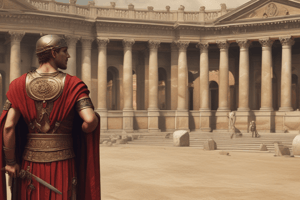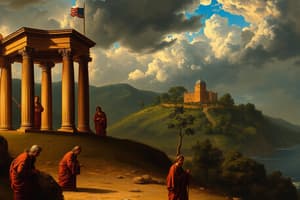Podcast
Questions and Answers
Who founded the city of Rome in 753 BC?
Who founded the city of Rome in 753 BC?
- Romulus and Remus (correct)
- Seven kings
- The Roman Senate
- Lucius Tarquinius Superbus
What was the system of government based on in the Roman Republic?
What was the system of government based on in the Roman Republic?
- Democracy and representation (correct)
- Monarchy
- Theocracy
- Aristocracy
What was the primary social class of aristocrats and nobles in the Roman Republic?
What was the primary social class of aristocrats and nobles in the Roman Republic?
- Equestrians
- Plebeians
- Patricians (correct)
- Slaves
Which region was NOT conquered by the Roman Empire?
Which region was NOT conquered by the Roman Empire?
What was a significant aspect of Roman culture?
What was a significant aspect of Roman culture?
What marked the end of the Western Roman Empire?
What marked the end of the Western Roman Empire?
Flashcards are hidden until you start studying
Study Notes
Origins and History
- The Roman civilization originated from the city of Rome, founded in 753 BC by Romulus and Remus
- Initially, Rome was ruled by seven kings, with the last king, Lucius Tarquinius Superbus, being overthrown in 509 BC
- The Roman Republic was established, with a system of government based on the principles of democracy and representation
Government and Politics
- The Roman Republic was governed by a system of checks and balances, with three branches of government:
- Senate: advised the consuls and governed the Roman state
- Assemblies: made laws and elected officials
- Consuls: executed the laws and governed the Roman state
- The Roman Republic was divided into three main social classes:
- Patricians: aristocrats and nobles
- Plebeians: common people and farmers
- Slaves: owned by wealthy Romans
Military and Expansion
- The Roman military was a powerful force, with a strong infantry and cavalry
- Rome expanded its territories through a series of conquests, including:
- Italian city-states
- Carthage and North Africa
- Gaul (modern-day France and Belgium)
- Britain
- Spain and Portugal
- Dacia (modern-day Romania)
- Middle East and Asia Minor
Culture and Society
- Roman culture was heavily influenced by Greek culture, with a focus on:
- Architecture: development of the arch, dome, and aqueduct
- Literature: poetry, drama, and historiography
- Art: sculpture, painting, and mosaic
- Engineering: roads, bridges, and public buildings
- Roman society was patriarchal, with men holding significant power and authority
- Women and slaves had limited rights and freedoms
Decline and Fall
- The Roman Empire began to decline in the 2nd century AD, with internal conflicts, corruption, and external pressures
- The empire was eventually divided into Eastern (Byzantine) and Western halves in 395 AD
- The Western Roman Empire fell to barbarian invasions in 476 AD, marking the end of the Roman Empire
Studying That Suits You
Use AI to generate personalized quizzes and flashcards to suit your learning preferences.





